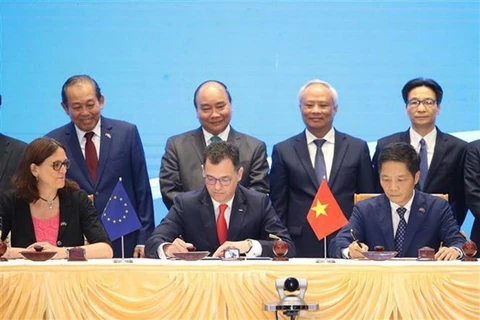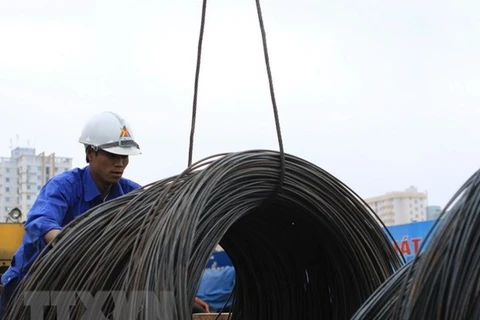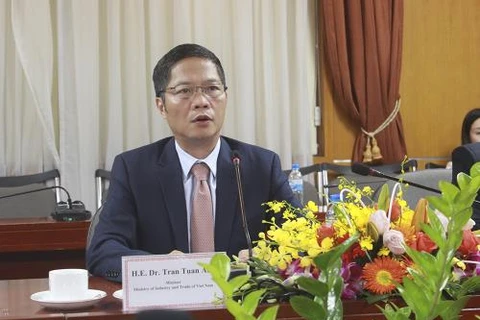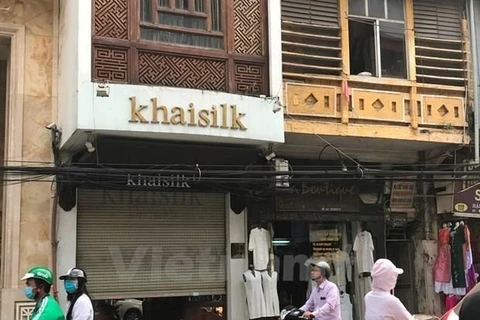Hanoi (VNA) - Trade defence measures both support the protection of domestic production and employment and reduce the dependence on imported goods, said an official from the Ministry of Industry and Trade.
Full and basic legal system
Implementing the policy of proactive economic integration, Vietnam’s economy has deeply integrated into the world. The country joined the World Trade Organisation (WTO) and the 17 free trade agreements (FTAs), including many new-generation FTAs such as the Comprehensive and Progressive Agreement for Trans-Pacific Partnership (CPTPP), and the Europe – Vietnam Free Trade Agreement (EVFTA).
The implementation of commitments in the WTO and FTA agreements has created great opportunities for the economy but also puts Vietnam’s manufacturing industries in strong competition of imported goods, especially those from regional countries.
According to the MoIT, to support businesses in protecting their legitimate rights, Vietnam has been promoting the role of trade protection measures as a tool to ensure the fair trade environment.
This is a group of anti-dumping, anti-subsidy and safeguard measures that the WTO and FTAs allow to prevent negative impacts of imported goods on domestic production and employment, thus ensuring economic and social security.
Along with complicated changes of the regional and global economy, and increasing trade protection policies of some major economies, countries around the world are also enhancing the use of trade defence measures to deal with imported goods.
According to the MoIT’s Trade Defence Department, the ministry has been standing side by side with enterprises to work with management agencies of other countries to protect legitimate rights and interests for Vietnam's exports.
The system of legal documents on trade defence of Vietnam is basically in line with international commitments to implementing trade defence activities in order to ensure a fair competition environment for domestic production, and benefits of consumers.
Among those are the Law on Foreign Trade Management No.05/2017/QH14 passed by the National Assembly on June 12, 2017. Decree No.10/2018/ND-CP dated January 15, 2018 by the Government detailing a number of articles of the Law on Foreign Trade Management on trade remedies; and Circular No.06/2018/TT- BCT issued by the MoIT on April 20, 2018, detailing some contents of Decree No.10/2018/ND-CP on measures of trade remedies.
Protecting and promoting domestic production
The MoIT has started investigation into 15 trade defence cases, including eight anti-dumping cases, six safeguard cases and one countervailing duty evasion case.
Compared with more than 150 cases countries imposed on Vietnam's exports, this number is still modest.
The ministry said that Vietnam only applies trade defence measures in case of extreme necessity on the basis of the results of investigations to ensure legal provisions.
Trade defence measures have contributed to protecting jobs of hundreds of thousands of workers in many industrial production sectors, and promoting domestic production.
The trade defence tax also helps increase the revenue for the State budget with total amount of up to trillions of dong.
Notably, many businesses have significantly improved their production and business, and escaped losses, such as the DAP-Vinachem Fertilizer JSC, the Viet Trung Steel JSC, the Vietnam - Italy Steel Joint Stock Company, and Pomina Steel Corporation.
More importantly, trade defence measures help not only protect domestic production and employment but also reduce the dependence on imported goods, especially for essential commodities such as iron, steel, and fertilizer.
Along with the application of trade defence measures, investigation cases of trade defence evasion for Vietnam’s export goods also increase. It is estimated that there have been 19 cases of anti-evasion investigation into Vietnamese exports.
According to Le Trieu Dung, General Director of the Trade Defense Department, the MoIT has actively implemented many measures to prevent trade defence evasion and origin fraud.
In addition, the ministry regularly organizes inspection delegations to verify the origin of goods for cases related to Vietnam’s exports such as automobile tires, painted steel, shrimp, solar cells exported to the EU; aluminum, plywood, cold rolled steel, corrosion-resistant steel, and ceramic tiles.
At the same time, it has also actively coordinated with investigation agencies of the US Department of Commerce (DOC) and the European Anti-Fraud Office (OLAF) of the EU in all the investigation cases./.
























